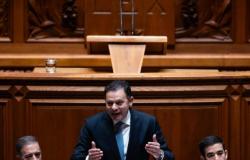In another quarter marked by the consequences of the operational adjustments of the restructuring plan, the Casas Bahia Group once again recorded disappointing results in the main lines of the financial statements.
According to the balance sheet released on Monday, March 25, the company closed the fourth quarter of 2023 with a net loss of R$1 billion, a strong increase compared to the loss of R$163 million recorded in the same period of 2022. Revenue Net income fell 16.2%, to R$7.4 billion, while adjusted EBITDA fell 74.1%, to R$163 million.
The result maintained the company’s negative sequence in the last line of its balance sheet – in the last six quarters, the company presented a net loss in five of them. Despite this, CEO Renato Franklin says there are reasons to celebrate the performance achieved in the last three months of last year.
Even with another quarter of losses behind him, he highlights that, for the first time in four years, free cash flow was positive, an indication that points to better days starting in the second half of the year and with a consistent recovery in 2025.
“Until September, I was very concerned about the ability to execute, to transform the company, but since November we have been in a different mood, with cash flow reflecting deliveries”, says Franklin to NeoFeed.
He highlights that Casas Bahia closed 2023 with a free cash flow, excluding the effects of the renewal of the agreement with Bradescard, positive R$648 million, after being negative in the last three years.
For Franklin, this is a sign that restructuring based on back to basics, focusing on the sale of white goods and electronics, is starting to show results. Cash flow was one of the first points he set out to improve. In an interview with NeoFeed, published in December last year, he expected a reaction on this front in 2024.
According to him, the execution of the transformation plan is progressing strongly, with progress in initiatives, with a positive impact of up to R$1.6 billion on the final result. The company proposed to reduce older stocks and non-standard categories by R$1 billion. core. In the fourth quarter, compared to the same period in 2022, there was a reduction of R$1.2 billion in inventories. Casas Bahia also reduced its headcount in 2023 by 8,600 positions, equivalent to around 20% of the total.
“Our plan is 18 months, we want to transform the company by the end of 2024. But when we take the levers that we set out to deliver, we are managing to exceed expectations”, he says. “All of this makes the company lighter for 2024 and for what we want in 2025.”
The accounting numbers show that operational adjustments do not come without costs in the short term. Between movements to reduce stocks, optimize the workforce, store closures and write-off of assets, in addition to the provision relating to the decision of the Federal Supreme Court (STF) on the ICMS tax rate differential (Difal), taken last year, Casas Bahia’s balance sheet suffered an impact of around R$600 million in the fourth quarter.
The evolution of cash
Despite the impacts of the adjustments, Franklin highlights that they “solved” a large part of the company’s problems. And, from now on, Casas Bahia should no longer record such relevant impacts, considering that the bulk of the adjustments have been made.
“In the first quarter of 2024, we will see a slightly cleaner quarter,” he says. “In the second quarter, we will capture more levers, and in the fourth quarter of 2024 we will see a much better quarter.”
Because of these adjustments, Franklin says that Casas Bahia should be a company with a lower GMV, because it stopped investing in segments that lost money, but were much more profitable, in addition to restructuring sales channels and being more rational in terms of prices. And we will start talking about profit expectations towards the middle of the year.
“The evolution of the fourth quarter was cash, not P&L [demonstrativo de lucro ou prejuízo]. Now we need to start running the company cleanly, buy merchandise again in the same volume as we used to, with the margin normalizing”, he says. “I’m happy with the operation and the macro of the economy.”
On the financial front, one of the main moves was the renegotiation of R$1.5 billion in debt maturing in 2024 and 2025, announced in February, with a new maturity in 36 months and cost of CDI plus 4% per year.
At the end of the fourth quarter, Casas Bahia’s gross debt totaled R$4 billion, slightly above the R$4.1 billion in the same period in 2022. The financial leverage indicator, measured by net cash/adjusted EBITDA for the last 12 months it was -0.3x times, while in the third quarter it was -0.5 times.
Casas Bahia shares closed today’s trading session with a drop of 2.94%, at R$6.60. In the year, they accumulated a drop of 40.5%, taking the market value to R$622.8 million.






